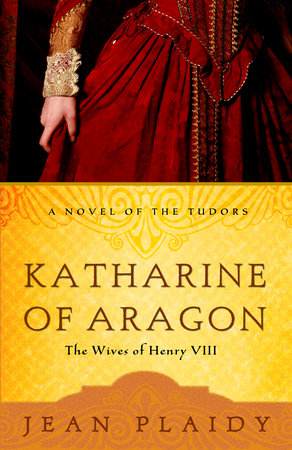Katharine of Aragon Reader’s Guide
By Jean Plaidy


1. During her early years in Spain, Katharine is frequently guided by her mother’s words about what is expected of a princess of Spain. Discuss what was expected of a Spanish princess, taking into account Isabella’s specific advice as well as Ferdinand’s expectations and the realities of Katharine’s experience. How does this advice guide her behavior as princess, and then as Queen?
2. Katharine lives in England for years, with her welfare largely dependent on the whims of Henry VII and the diplomacy of her father’s ambassadors. In the end, her patience seems to be rewarded—again by the whim of a king. What do you make of her obedience in staying in England all those years? Was this a wise gamble? Were any other options open to her? What might have happened if she had taken a more active role in her own fate or continued as ambassadress after de Puebla’s retirement?
3. In the years after Arthur’s death, is Katharine herself aware of—or interested in—the value of her marriage for Spain, or is she simply hoping to secure a comfortable future for herself and her attendants? Does her reaction to news of Francesca’s engagement say anything about how her hopes for her own marriage may have changed? Is her view of the arrangements for Princess Mary’s marriage consistent with what she hoped for in her own?
4. What do you think would have become of Katharine if Henry VIII had not chosen to marry her? Would she have remained in England? Where else might she have sought to marry?
5. Discuss how circumstances in Spain and England would have been different if Katharine and Juana’s roles had been reversed. Would Katharine have tolerated Philip’s philandering? Would she have stood firm in her claim to Castile, or allowed Philip’s flag to fly beside hers over Spain?
6. What do you make of Ferdinand? What are his defining qualities as a ruler and as a father? Is his treatment of Juana kinder than Philip’s was? How does his inconsistent correspondence with Katharine reflect his feelings toward her? Discuss how his reflections at the end of his life comment on his view of himself and his role as a monarch.
7. Discuss Henry’s relationship with his conscience. How does he make moral decisions? What, in his eyes, makes him a virtuous man?
8. During the course of the book, Henry is attracted to many women other than his wife, but Bessie Blount and Anne Boleyn intrigue him more than most. What is it about each of them that attracts him? What hope does Anne have of holding his attention? What advice might you offer her to safeguard her position?
9. How does Henry’s love of pageantry guide his reign and his marriages? Is he, to some extent, merely playing the role of the virtuous king? Do you think Katharine is right when she believes he is still thinks like a pleasure-loving boy? If not, when does this mentality end? By the end of the book, is Henry deluded and misguided, as Katharine often considers him, or is he a fully cognizant tyrant? Is there a middle ground?
10. Discuss Henry’s relationship with Ferdinand and Maximilian, the two elder rulers who were able to outmaneuver and deceive him. How did Henry’s interactions with them help educate him as a ruler? How does this education at the hands of Maximilian and Ferdinand affect his dealings with the next generation of rulers, Charles and François? In what ways do Henry’s natural qualities help or hinder his standing with the European monarchs?
11. What kind of a pope would Wolsey have been? Discuss how his election to the Vatican would have affected his hidden family and his relationship with Henry. Would his loyalty to the English King have led him to work for England’s interests, or would he have abandoned his former friend and benefactor to establish his own power as pope?
12. How would you describe Henry’s priorities as King? Can you identify one or more guiding principles to his reign? What do his words and actions with the pregnant Katharine when he is on his way to battle in France—and again on his return, after her miscarriage and defense of England—say about how his many goals relate to each other? Does this relationship remain more or less consistent through his reign?
13. What might Cardinal Wolsey have done to secure his position with the King? Is there any way that he and Anne Boleyn could have peacefully coexisted? Discuss what factors you consider most significant in Wolsey’s downfall.
14. Discuss Katharine’s relationship with the women of her household, which included Wolsey’s spies and noble beauties to attract the king as well as loyal Spanish friends. Were they more a danger to her or a comfort? How were they most useful to her? How were they most harmful? In what ways did Katharine learn to choose whom to trust, and whom merely to tolerate? Do you think she made the right decisions?
15. What, if anything, would have satisfied Henry? Can you imagine a wife who could have answered all his needs—or an arrangement allowing his needs to be met by others—that might have kept peace in the palace? A military victory that would have given him the triumph he longed for? Were any of his goals truly attainable, or was he destined to always want more?
Just for joining you’ll get personalized recommendations on your dashboard daily and features only for members.
Find Out More Join Now Sign In